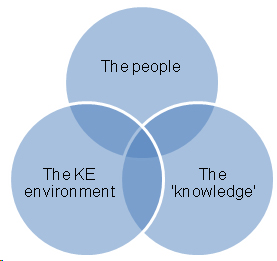KE of science - changing behaviours that challenge society
Published on 25 April 2012 in Sustainability and Communities
Introduction
Society today faces a number of challenges, such as climate change, that require individuals to collectively change their behaviour in ways that incur additional costs (financial and/or non-financial). Scientific research has a key role to play in supporting such behavioural change. For example through the development of new knowledge and understandings it can:
- Identify critical barriers that prevent people from adopting more desirable behaviours.
- Determine and develop ways to reduce the cost of adopting new behaviours, including new technologies.
- Assist in the development of more effective policy interventions that will encourage desirable behavioural change.
These effects however can only be realised if scientific findings are effectively communicated to potential end-users, including policy makers, and if scientific studies appropriately address problems as they really appear to a decision-maker (individual in society). That is, if effective knowledge exchange (KE) is achieved.
Key Points
 At the core of effective KE are three basic and interconnected components.
At the core of effective KE are three basic and interconnected components.
The people in this context typically there are two key groups – scientists and potential end users. Those involved must be able to communicate their knowledge in terms readily understandable by other parties and be ready to discover new things as well as explain what they know. This requires an understanding of the current level of knowledge held by all involved.
The ‘knowledge’ that is being exchanged needs to be relevant and sufficiently complete to allow potential end-users to apply it correctly. In addition, it must be pitched at a level appropriate to currently held knowledge.
The KE environment: the place (facilities, ease of access etc.), time, time set aside by each person for the KE are all factors that can facilitate or constrain.
Synergistic combinations of people, knowledge and environment will maximise the KE achieved.
Behavioural change can be described in a series of stages:
- Becoming aware of a problem caused by a behaviour, for example, that greenhouse gases (GHG) are generated when fossil fuels are burnt and are a causal factor in climate change.
- Evaluating alternative behaviours to identify better. For this both the available options and their impact need to be identified.
- Testing of alternatives to check if the prior evaluation was correct and determine any aspects that need reconsideration. For example, changing from driving to work to travelling on public transport may seem feasible, but when tested if the planned bus is always full another bus route/time may need to be evaluated.
- Adoption of new behaviour.
Maximising the effect of scientific KE at each of these behavioural change stages could speed up desired behavioural change and contribute to greater progress in addressing climate change and other challenges.
Research Undertaken
Over the last 6 years SRUC (formally SAC) has specifically evaluated its KE events using exit questionnaires and on one occasion a ‘look-back’ study to investigate their effectiveness. In the early years respondents were asked typically about the ‘usefulness’ and ‘relevance’ of KE events as indicators of whether the event might encourage behavioural change. More recently evaluations have specifically sought to assess impact at different behavioural change stages and learn more about what defines a synergistic combination of ‘people’, ‘knowledge’ and ‘KE environment’. Our results are fed back to those concerned to improve KE and ultimately the science on which it depends.
Policy Implications
KE is undertaken alongside academic publication of scientific findings but is not always given the same level of importance or thought of as an integral part of an effective scientific process as described above. These perceptions are affected by how funders record and recognise KE activities undertaken by scientists.
Many high level indicators of the impact of science, such as reduced national use of fossil fuels, are underpinned by small changes in people’s behaviour. Assessing the influence of science on individual potential end-users via KE can provide some early insights into likely changes in macro indicators, facilitating earlier identification of actions that will support desirable behavioural change.
Lack of time to engage with scientists is a problem for many potential end-users including policy makers and needs to be given adequate priority.
Author
Dr Catherine E Milne Cath.Milne@sruc.ac.uk
Topics
Sustainability and Communities





